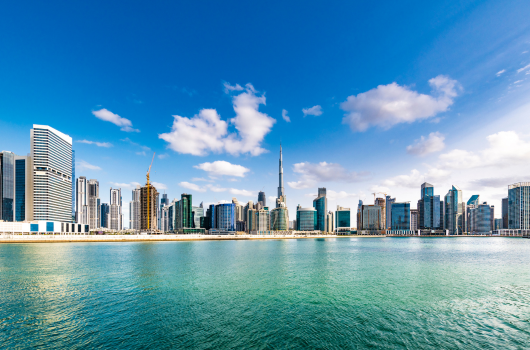By Sakani
Can foreigners buy real estate in Dubai? A guide for expats in 2024

Foreign investors, including non-residents, are eligible to buy properties in Dubai. Since 2002, the Dubai government has permitted foreigners, including non-residents, to purchase properties in designated "freehold" areas, which are specifically allocated for foreign ownership. These zones offer buyers full ownership rights, allowing them to buy, sell, lease, or transfer the property without restrictions based on nationality. Properties in sought-after locations like Downtown Dubai, Dubai Marina, and Palm Jumeirah fall within these areas, providing appealing investment opportunities.
Additionally, Dubai enhances its attractiveness for investors by offering a long-term UAE residence visa for those who purchase property above a certain value threshold. This visa option not only makes Dubai a desirable investment destination but also a potential new home for property owners. The UAE government has created a favorable environment for international investors through regulations that guarantee property rights and support long-term residency options for property owners.
Key Takeaways:
Freehold Areas: Foreigners can own property outright in designated zones.
Legal Protections: Dubai’s legal framework ensures the rights of property owners are safeguarded.
Long-term Residency: Recent policies provide longer residency visas for property investors, enhancing the appeal of purchasing real estate.
Emerging Investment Opportunities
While traditional hotspots like Dubai Marina and Downtown Dubai remain sought-after, several emerging communities offer exciting investment potential:
Dubai South: Known for affordability and proximity to Expo 2020 and Al Maktoum International Airport, Dubai South is emerging as a hub for future growth, particularly for budget-conscious investors.
Dubai Creek Harbour: As a waterfront development with a blend of luxury and affordable options, this area is set to become a major cultural and business hub, making it ideal for long-term investments.
Emaar Beachfront: Nestled between Palm Jumeirah and Dubai Marina, this luxurious community provides a serene and less crowded atmosphere while remaining conveniently located near two of Dubai's busiest areas.
Jumeirah Village Circle (JVC): Known for its affordability, JVC features a mix of villas and apartments. It is particularly appealing to young professionals and families, with ongoing infrastructure improvements signaling future growth.
Al Furjan: This developing area is ideal for long-term investment, offering family-friendly amenities and planned enhancements such as the Dubai Metro extension, increasing accessibility.
Mohammed Bin Rashid City (MBR City): Strategically located near Downtown Dubai, MBR City features luxury projects and is becoming increasingly popular among investors.
Tilal Al Ghaf: A family-friendly community that combines nature-inspired living with affordable luxury villas and townhouses, offering long-term growth potential as more families seek quality living spaces.
Benefits of Investing in Dubai Real Estate
Investing in Dubai offers a variety of advantages that make it a highly sought-after market for international buyers:
Tax-Free Property Ownership: Dubai does not impose property taxes or taxes on rental income. This allows investors to maximize their rental yields and profits without worrying about additional costs.
High Rental Yields: Dubai offers some of the highest rental yields globally, particularly in popular areas like Dubai Marina and JVC. Depending on the property and its location, rental returns can range from 7% to 12%. This strong rental market makes Dubai a lucrative option for both short-term and long-term investment strategies.
Transferability: Another advantage for foreign investors is the ease of transferring property ownership. Foreigners can seamlessly transfer ownership of their properties to family members or heirs, ensuring that the asset remains within the family.
Access to Long-Term Residency: Investing in property in Dubai above a certain value can provide investors with access to long-term residency options. According to the Dubai Land Department (DLD), real estate investors who purchase property valued at AED 750,000 or more are eligible to apply for a two-year renewable residence permit. For the Golden Visa, investors must own property worth AED 2 million or more to qualify for a ten-year renewable residence permit. This visa allows for family sponsorship, including spouses, children, and parents. If the property is mortgaged, a bank letter confirming the payment of AED 2 million must be provided as proof.
Current Trends Impacting the Market
The Dubai real estate market is undergoing several noteworthy trends as we progress through 2024:
Sustainability Focus: There is an increasing emphasis on eco-friendly developments, driven by Dubai’s commitment to sustainability aligned with UAE’s Vision 2030. Developers are incorporating green building standards into their projects, which are becoming more appealing to environmentally conscious investors.
Sustained Demand for Luxury Properties: There has been a significant influx of high-net-worth individuals (HNWIs) from various regions, particularly Europe and Asia, leading to heightened demand for luxury properties. Prime locations like Palm Jumeirah and Downtown Dubai are seeing strong interest, driven by the appeal of high-end, ultra-modern homes.
Pro-Investment Policies: The UAE government continues to enhance its investment-friendly framework, including long-term residency visas for property investors, as mentioned above.
Adapting to Economic Conditions: Global economic factors, such as rising interest rates and geopolitical tensions, are influencing the market. While these factors may pose challenges, the overall stability and growth prospects of the Dubai real estate market remain positive, bolstered by ongoing economic development and infrastructure projects.
Emerging Markets for Affordable Housing: In addition to luxury developments, there is a growing demand for affordable housing in emerging communities. This trend reflects a shift towards meeting the needs of middle-income buyers and families seeking more accessible housing options.
Evolving Commercial Real Estate Landscape: The commercial sector is also experiencing growth, particularly in flexible workspaces and mixed-use developments, adapting to new work patterns post-pandemic. This trend indicates a diversification of property types that can meet the changing needs of businesses and individuals alike.
Conclusion
Dubai’s real estate market in 2024 offers a diverse range of opportunities for foreign investors, extending beyond traditional hotspots. By understanding the regulations and exploring emerging communities, international buyers can find rewarding investments in this vibrant city. As the market continues to evolve, conducting thorough research and considering partnerships with real estate experts will be essential for navigating this dynamic landscape.